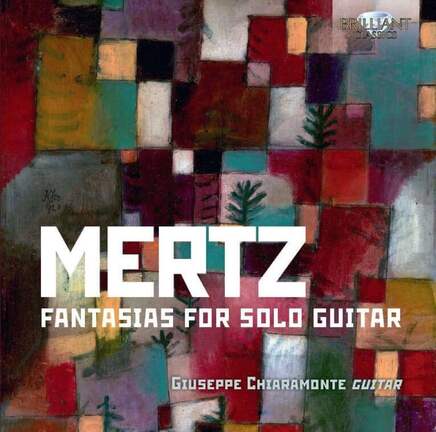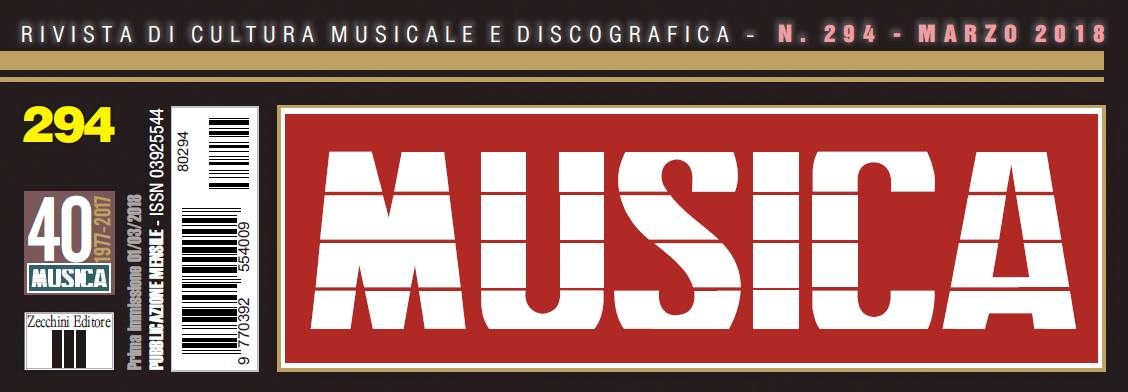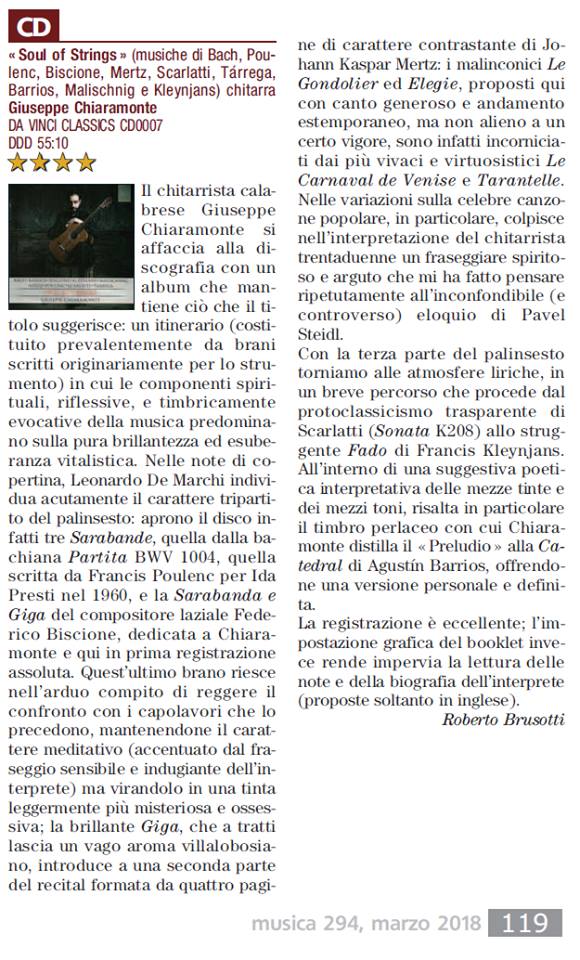|
Link: http://musicweb-international.com/classrev/2019/Apr/Mertz_fantasias_95722.htm
Johann Kaspar MERTZ (1806-1856) Fantasias for Solo Guitar Trois Morceaux, Op. 65 [21:28] Pianto dell’Amante [6:12] La Rimembranza [8:29] Pensée Fugitive [10:05] Harmonie du Soir [10:03] Fantasie über Motive aus der Oper: Don Juan (Mozart) [6:43] Giuseppe Chiaramonte (guitar) rec. 2018, Cappella dell’Immacolata, Collegio Rotondi, Gorla Minore, Italy BRILLIANT CLASSICS 95722 [63:05] In recent years, as I have become more and more interested in the repertoire for solo guitar, it has seemed to me that one quite interesting area of the instrument’s tradition has suffered relative neglect. I have in mind the music written in response to the flowering of interest in the guitar in Vienna in the first half of the nineteenth century. There were many amateur guitarists in the city along with some players of the instrument who sustained professional careers. Amongst this latter group were composers who wrote predominantly or exclusively for the guitar. Relevant names include Simon Molitor (1766-1848), Leonhard van Call (1767-1817), Anton Diabelli (1781-1858, Wenzel Thomas Matiegka (1773-1830), Alois Wolff (1775-1819) and Johann Kaspar Mertz (1775-1819). Where music for the solo guitar is concerned, some of these composers largely wrote and published pieces which in the words of Alois Mauerhofer in his entry on Leonhard von Call in New Grove, were “suited [to] the tastes and demands of amateur players who wanted pleasant music that could be performed easily”. But others, such as Molitor and Matiegka, also wrote demanding pieces well beyond the skill set of the amateur player (pieces such as Molitor’s Great Sonata, Op.7 and Sonata Op.12, or several of Matiegka’s sonatas, such as his Sonate progressive Op.17 and Grande Sonata No. 1). An important influence on the Viennese fashion for the guitar was the presence in the city, from 1806 to 1819 of the Italian Mauro Giuliani (1781-1829), widely regarded as the greatest of the age. Johann Kaspar Mertz was the last of the important Viennese guitarists (strangely he has no entry in New Grove). His compositions were definitely not for amateurs, being almost uniformly virtuosic in their technical demands. In his booklet note to this CD, Giuseppe Chiaramonte quotes Mertz’s explanation of why many of his compositions were not published during his lifetime: “In seeing these, the publishers would say it was too difficult, [so] that I would have to rearrange them. That would spoil the composition”. Elsewhere in his excellent notes Chiaramonte, who can certainly be described as a virtuoso, makes the following observation, “The style in Mertz’s Fantasias is truly outstanding, virtuoso, brilliant. They are extremely demanding technically: rapid chord changes in all positions; octaves progressing up to the high frets; successions of elaborate arpeggio patterns, often requiring very rapid right-hand thumb movements, trills on one and two strings; various types of tremolo passages; complex embellishments with flurries of notes; una-corda passages with glissando and slurs. The full extension of the instrument is used, and the whole dynamic range between pianissimo and triple forte”. Many of Mertz’s titles have about them a Lisztian air – one is reminded of compositions by Liszt, by titles such as ‘Harmonie du Soir’, ‘Le Gondolier’, ‘Pensée Fugitive’ and ‘Fantasie Hongroise’. Mertz, it should be remembered, was – like Liszt – Hungarian, having been born in Pressburg (now Bratislava), which was then the capital of the Kingdom of Hungary (then a territory of the Austrian Empire). To quote Chiaramonte again, in Mertz’s fantasies “Expressions like ‘con fuoco’, ‘con bravura’ … ‘brillante’ … are counterpoised by expressions like … ‘lugubre’, ‘tristamente’, ‘con dolore’. Each piece is perfectly in balance between the two most distinguishing aspects of romantic art … [the] ‘flamboyant’ and ‘larmante’”. If the listener starts (as this CD does) with Mertz’s ‘Fantasie Hongroise’ (s)he will soon be ready to think of Mertz as what Chiaramonte calls him - “The Liszt of the guitar”. In mood and technical brilliance, in emotional expressiveness and in the use of folk material, the comparison with Liszt is irresistible. Obviously, Mertz was a ‘narrower’ composer than Liszt, just as the guitar has fewer resources than the piano, so there is no claim here that Mertz was in any sense the equal of Liszt. Rather, that Liszt provides the right stylistic context within which to listen to, and talk about, Mertz. At times, as with Liszt, the textures sound almost oppressively opulent, but there is behind (and through) such textures a clear musical argument and structure, even if, as befits pieces called fantasias, there is often a sense of the improvisatory. These are true Romantic ‘fantasias’ in the best sense. Like Liszt, Mertz wrote a number of virtuosic pieces based on themes from popular operas. We are given just one such work on this CD – in the form of Mertz’s take on an opera that also fascinated Liszt, Mozart’s Don Giovanni. These are the best performances of Mertz’s solo pieces that I have heard – the closest rivals, among recordings I have heard are Raphaëlla Smits collection Le Romantique (ACCENT ACC 24303) and Frank Bungarten’s Johann Kaspar Mertz: The Last Viennese Virtuoso (MDG 905194). Chiaramonte, I find, does more justice to the poetic dimension of Mertz’s writing, while also revelling more wholeheartedly in the virtuosity of the music. The instrument played by Giuseppe Chiaramonte is a joy in itself – a 6-string guitar, called ‘La antiqua’ and made in 2016 by Mario Grimaldi, of “exceptionally old wood, and possessing a traditional ‘old world’ sound able to confer to the music of Mertz a wider variety of colours compared to the Viennese romantic guitar of his time. Given, in addition, the insightful booklet notes and a vivid recorded sound (but not excessively so) this is, to my mind, the one album of music by Mertz that every guitar enthusiast should own. The instrument played by Giuseppe Chiaramonte is a joy in itself – a 6-string guitar, called ‘La antiqua’ and made in 2016 by Mario Grimaldi, of “exceptionally old wood, and possessing a traditional ‘old world’ sound able to confer to the music of Mertz a wider variety of colours compared to the Viennese romantic guitar of his time. Glyn Pursglove
0 Comments
|
BLOGArchives
April 2022
Categories
All
|



